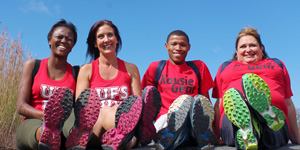These boots are made for walking ... to Cape Town
 |
On Thursday 1 May 2014, four pairs of feet gave their first stride on a journey that will last for 33 days and stretch over 1 000 kilometres.
These feet belong to four very brave volunteers who will walk all the way to the Cape in order to highlight the problem of food insecurity among students.
Adéle van Aswegen and Ntokozo Nkabinde from the University of the Free State (UFS), together with Ronél Warner and Nico Piedt, both from Bloemfontein, are undertaking this hike as part of a fund-raising effort for the UFS’s No Student Hungry bursary (NSH bursary).
The NSH bursary, established in 2011 by Prof Jonathan Jansen, the UFS’s Vice-Chancellor and Rector, and Rudi Buys, Dean of Student Affairs, is aimed at alleviating food insecurity among students at the UFS.
The food bursary is awarded on the grounds of financial need, good academic performance, active participation in student-life programmes and a commitment to community service.
“The NSH bursary of about R30 per student forms only a small part of a student’s day, but it makes a huge difference in their lives,” says Vicky Simpson, coordinator of this programme offering assistance to more than 100 students.
You can follow our hikers’ progress on Twitter by using the #NSHstride. We will also keep you updated on Facebook and our website.
Meanwhile, everyone is invited to show their support for the hikers in a fun way. Take a picture of your foot (or feet), tweet the photo with #NSHstride @UFSweb or post it on your Facebook page and challenge all your friends to do the same.
Daily updates:
(You can also follow us on @UFSweb for daily tweets)
Day 14: 14 May 2014
18:33
43 km
Joalani Guest Farm
Day 13: 13 May 2014
17:30
33 km
Die Rondawels
Day 12: 12 May 2014
16:49
40 km
Aandrus B&B in Richmond
Day 11: 11 May 2014
39 km
Wortelfontein (Magdel and Christiaan)
Day 10: 10 May 2014
15:44
34 km
Hanover Lodge
Day 9: 09 May 2014
40.8 km
Camping between Colesberg and Hanover
Day 8: 08 May 2014
15:25
33.7 km
Colesberg, The Lighthouse Guesthouse
Day 7: 07 May 2014
15:08
23 km
Orange River Lodge
Day 6: 06 May 2014
15:57
51.06 km
Gariep Forever Resort
Day 5: 05 May 2014
12:18
28 km
Rondefontein
Day 4: 04 May 2014
15:27
35 km
Trompsburg: Fox Den
Day 3: 03 May 2014
17:30
46.74 km
Edenburg Country Lodge (Hotel)
Day 2: 02 May 2014
11:44 am
15.3 km
Tom's Place
Day 1: 01 May 2014
32 km
Leeuwberg